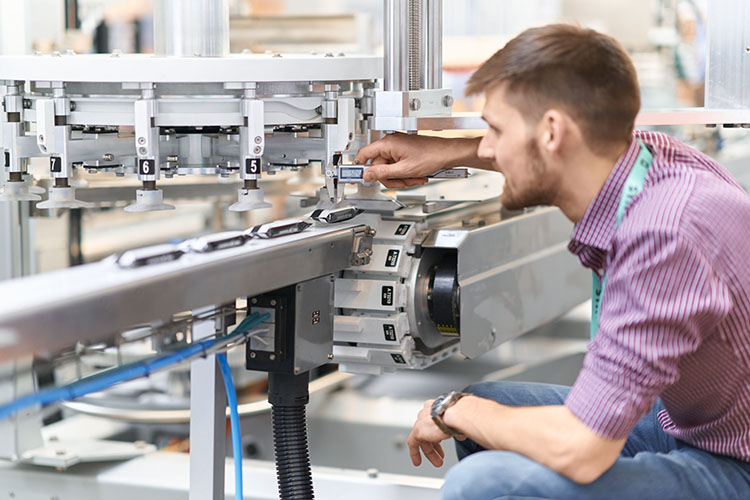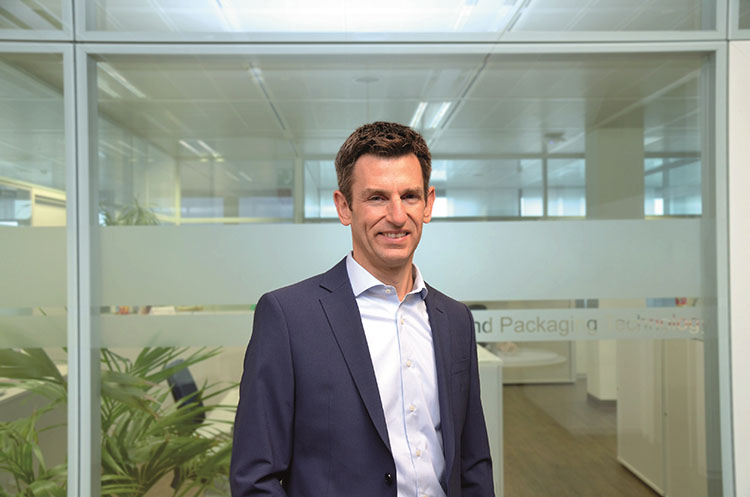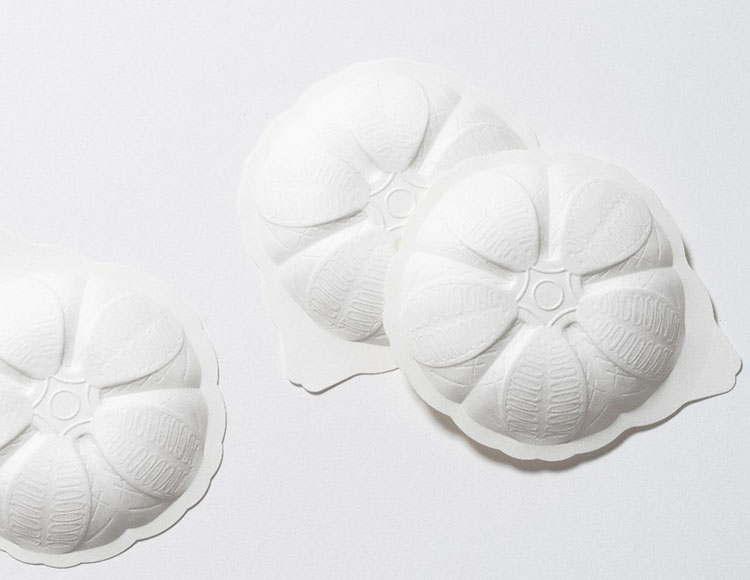
At the beginning of 2020, Syntegon Technology became an independent company when it was taken over by an investor from the packaging division of Bosch. bbi talks with Clemens Berger, Managing Director Food, about how the company is focusing on intelligent, sustainable technologies.
bbi: Mr Berger, how did your customers react to the reorientation?
Berger: They were very relaxed about it. Many of our customers have experienced change in the ownership structure of their own companies. For us, having a new shareholder and our own independence offers many opportunities. With CVC Capital Partners, we have an investor who wants to make our company even stronger. This is also very persuasive for our customers and most importantly; we are continuing to build outstanding plants and machines for the food industry.

Clemens Berger
bbi: With 6,100 employees, over 30 locations and sales of around EUR 1.3B, you describe yourself as the market leader in the process and packaging industry. How important are the manufacturers of baked goods and biscuits to you?
Berger: Processing machines, the packaging of biscuits, baking and confectionery are all important components of our business. We are very well positioned with our extensive portfolio: From process technology to secondary packaging, we offer individual machines, specialized designs, complete systems and services. Our competence center for horizontal packaging is located in Beringen, Switzerland. Solutions for process technology are produced in Viersen. In the biscuit, bakery and confectionery sectors, we see growth potential in the double-digit percentage range over the next five years. This is partly due to the increased industrialization of the bakery market. The number of regional products is also growing, as is customer expectation for high-quality packaging. We see particular growth opportunities in Asia, where new producers, especially in the biscuit and bar segments are coming onto the market.
bbi: What trends do you see in the food market?
Berger: The variety of products is increasing; packaging is becoming smaller and more versatile. Food manufacturers want to differentiate themselves from other market participants. For this, fast product launches are important. We offer the answer: flexible and modular machines for a variety of products and packaging styles. Another trend is the increasing demand for sustainable packaging, often putting alternative materials in focus. Syntegon Technology focuses primarily on paper and mono-materials. Our customers are also faced with the problem of a shortage of skilled workers. It is therefore important for them to train their production personnel as simply and effectively as possible, for example for format changes and maintenance. We make this possible with digital solutions such as our Maintenance and Operations Assistant. Operators can be trained and maintenance can be planned more efficiently. Downtimes can thus be reduced by about one third. Furthermore, our machines are simple and intuitive to use.
bbi: How is the demand for pick and place robots developing?
Berger: Today, about 5,000 pick and place robots are sold in the food sector worldwide each year. According to a study by the International Federation of Robotics, market demand will triple by 2025. The main drivers are increasing product variance with smaller batches and growing cost pressure. Pick and place robots help to select and portion a wide variety of products efficiently. Syntegon Technology offers robots that can be used flexibly. We will expand our development activities in this area.
bbi: What requirements must horizontal or vertical packaging machines meet today?
Berger: Consumers and retailers are increasingly demanding regional, seasonal and specialized products such as organic, vegan or gluten-free. Products are becoming more heterogeneous in terms of shape and consistency, which increases the demand for horizontal packaging machines with intelligent and flexible feeding and handling systems. Another trend is the growing online trade, especially in Asia. These developments ultimately lead to smaller quantities within individual orders. The right response to these trends is machine flexibility. Syntegon machines are designed to process a wide range of packaging materials. This enables us to react to changing customer requirements in terms of material, product format, speed and volume, at any time. Our modular systems enable fast delivery times and immediate commissioning without long test phases. Another lever is automation. With digital early fault detection and robotic approaches, machines can act even more independently when changing formats.
bbi: What is the significance of sustainability in the packaging of baked goods?
Berger: The development of sustainable packaging solutions is a high priority for us. This also applies without restriction to baked goods and is confirmed by the demand from our customers.
We are pursuing two important development approaches for primary packaging: firstly, the use of monomaterials compared to conventional films and paper packaging as an alternative to plastic. In the case of secondary packaging, which is usually made of cardboard, the main concern is to optimize its suitability with regard to robustness and variability for e-commerce applications. By dispensing with adhesives, we also reduce the burden on recycling streams.
For food packaging we are working on making sealing seams as narrow as possible. We are demonstrating ways of saving material by sealing packages with ultrasound instead of the more typical cold or heat sealing. We are also supporting customers in the use of extremely thin films.
We understand sustainability not only in terms of environmentally friendly materials, but also in terms of product protection. The overriding goal is to create a packaging solution that safely packs biscuits and baked goods and enables an optimal shelf life. This is because considerably more CO2 is consumed in the manufacture of the product than in its packaging. Therefore, the topic of avoiding food loss or food waste is also high on our list of priorities.

Together with BillerudKorsnäs, Syntegon Technology developed a new packaging concept called Shaped Paper Pod (paper structural trays)
bbi: What are the best alternatives to multilayer films for biscuits and crackers?
Berger: There are 2 examples. Firstly: Using the new “paper-ON-form” retrofit set from Syntegon Technology on horizontal form fill seal machines enables cold sealable barrier papers to be processed. The set consists of a patented tubular bag forming and sealing tools adapted to the paper packaging material for cold sealing applications. It is already being used on existing lines of international manufacturers for the packaging of chocolate bars in paper. This can also be used for biscuits and crackers.
Secondly, our Amplified Heat Sealing (AHS) technology with linear drive makes it possible to increase the heat input into the packaging material. This is made possible by superimposing the rotary movement of the sealing tools and the linear movement of the transverse sealing station. Since monomaterials often consist of a more temperature-sensitive carrier layer than composite films, defective-sealing seams can easily occur. Due to the sensitive heat input of the AHS technology, monomaterials can be better processed and used for products such as cookies and crackers.
bbi: Can you go into detail about the Shaped Paper Pods portion pack concept?
Berger: Together with our Swedish cooperation partner BillerudKorsnäs, we have developed a new packaging concept called Shaped Paper Pod, which enables creative and sustainable packaging solutions made of paper. The 3D-formable FibreForm® paper from BillerudKorsnäs is used on a newly developed paper forming machine from Syntegon Technology. In the Shaped Paper Pods portion pack, this concept is used for both lumpy as well as viscous products. Due to its special shape, Shaped Paper Pods offers both mechanical protection for fragile products and barrier solutions. Shaped Paper Pods is also suitable for biscuits and crackers, which can therefore be packaged more sustainably. Due to the possibility of portion packaging, the product stays fresher longer and food waste is avoided.
bbi: Mr Berger, thank you very much for the interview.


